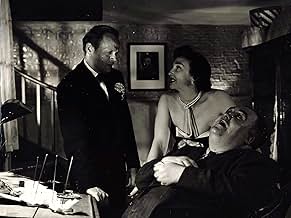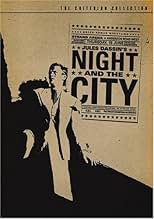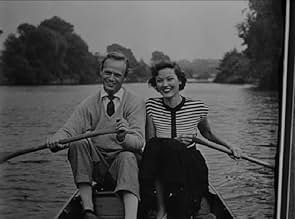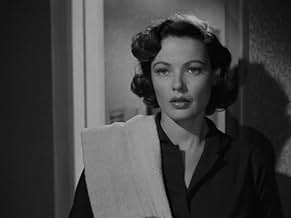AVALIAÇÃO DA IMDb
7,8/10
16 mil
SUA AVALIAÇÃO
Adicionar um enredo no seu idiomaA small-time grifter and nightclub tout takes advantage of some fortuitous circumstances and tries to become a big-time player as a wrestling promoter.A small-time grifter and nightclub tout takes advantage of some fortuitous circumstances and tries to become a big-time player as a wrestling promoter.A small-time grifter and nightclub tout takes advantage of some fortuitous circumstances and tries to become a big-time player as a wrestling promoter.
- Direção
- Roteiristas
- Artistas
Ken Richmond
- Nikolas of Athens
- (as Ken. Richmond)
Paul Beradi
- Diner
- (não creditado)
Derek Blomfield
- Young Policeman
- (não creditado)
Clifford Buckton
- Policeman
- (não creditado)
Ernest Butcher
- Bert
- (não creditado)
Peter Butterworth
- Thug
- (não creditado)
Naomi Chance
- Nightclub Hostess
- (não creditado)
Edward Chapman
- Hoskins
- (não creditado)
Avaliações em destaque
The more films I see by Jules Dassin, the more I wonder why he isn't better known or regarded as a director. It's been 56 years since he was blacklisted by the McCarthy-ites, but his reputation never seems to have recovered, at least not in the United States. Hopefully, more DVD releases like the Criterion version of Night and the City will bring deserved attention to his excellent body of work.
I want to call Night and the City a classic film noir, which it is, but that seems too limiting. It might be better to say that Dassin uses film noir to dig a little deeper into our human strivings and sufferings. There's a lot of sweat and desperation in the midst of this entertaining and well-paced film, and not just on the part of Harry Fabian, the small-time hustler who dreams of being great. We encounter a typically smooth and dangerous mobster who also happens to have a difficult relationship with his disappointed father. A wealthy but thugish club owner, who might be a caricature in another film noir, can't seem to express his powerful and animalistic feelings for his beautiful wife. She seems like a scheming femme fatale but turns out to have an almost quaint dream of her own. In the end, we're in the muck and mire of human foibles, a kind of low-level Shakespearean tragedy that we all live out to one degree or another. This story just happens to take place in the shadowy underworld of 1950 London.
There's a poignancy to this film that separates it from others in the noir genre. Part of this lies in the strong writing, part in the excellent acting ensemble. This is one of those rare and remarkable films where the secondary and minor actors seem like they were all giving the performance of their career. Richard Widmark probably could have done with a bit more subtlety as Harry Fabian; he feels a bit histrionic at times, but his manic energy is important to the pace of the film and the feeling of increasing desperation. Gene Tierney and Hugh Marlowe don't get to do much and seem a bit lost among all the other great roles. In an interview with Dassin included with the DVD, the director says he put Tierney in the film as a favor to producer Daryl Zanuck, adding her role at the last minute, and it feels like that at times. But, hey, it's Gene Tierney.
Herbert Lom delivers a chilling performance as Kristo the mobster, and Stanislaus Zbyszko is a miracle as his father, the once-famous wrestler Gregorious who can't stand that his son has helped kill the great tradition of Greco-Roman wrestling with his shoddy wrestling matches. The great Mike Mazurki does well as The Strangler, and the wrestling match he gets into with Gregorious may be the highlight of the film. Zbyszko and Mazurki were both former wrestlers, and the realism of their fight heightens the emotional intensity of the scene. It's the brutal scruff and claw of existence brought to life on screen for a few powerful moments.
I had never seen Francis Sullivan before, so I was pleasantly surprised by his masterful work as the club owner Nosseross. Googie Withers also does a great job as his wife Helen, managing to bring some good shading to an underwritten role. And some of the best moments of the film are delivered by minor characters such as Anna, the woman who works down on the docks; Figler, the "King of the Beggars;" and Googin the forger.
After a brief voice-over intro, Dassin starts the action with a bang, as one man chases another through the darkness of late-night London, across what looks like the plaza in front of the British Museum (???). The camera angle on this opening is fantastic, the kind of shot you want to turn into a poster and hang on your wall. And the camera work remains excellent throughout the film. The final long sequence of Harry running all over London in the foggy darkness, with the whole world seemingly after him, is an exciting and powerful climax. Quite a memorable ending to this excellent film.
I want to call Night and the City a classic film noir, which it is, but that seems too limiting. It might be better to say that Dassin uses film noir to dig a little deeper into our human strivings and sufferings. There's a lot of sweat and desperation in the midst of this entertaining and well-paced film, and not just on the part of Harry Fabian, the small-time hustler who dreams of being great. We encounter a typically smooth and dangerous mobster who also happens to have a difficult relationship with his disappointed father. A wealthy but thugish club owner, who might be a caricature in another film noir, can't seem to express his powerful and animalistic feelings for his beautiful wife. She seems like a scheming femme fatale but turns out to have an almost quaint dream of her own. In the end, we're in the muck and mire of human foibles, a kind of low-level Shakespearean tragedy that we all live out to one degree or another. This story just happens to take place in the shadowy underworld of 1950 London.
There's a poignancy to this film that separates it from others in the noir genre. Part of this lies in the strong writing, part in the excellent acting ensemble. This is one of those rare and remarkable films where the secondary and minor actors seem like they were all giving the performance of their career. Richard Widmark probably could have done with a bit more subtlety as Harry Fabian; he feels a bit histrionic at times, but his manic energy is important to the pace of the film and the feeling of increasing desperation. Gene Tierney and Hugh Marlowe don't get to do much and seem a bit lost among all the other great roles. In an interview with Dassin included with the DVD, the director says he put Tierney in the film as a favor to producer Daryl Zanuck, adding her role at the last minute, and it feels like that at times. But, hey, it's Gene Tierney.
Herbert Lom delivers a chilling performance as Kristo the mobster, and Stanislaus Zbyszko is a miracle as his father, the once-famous wrestler Gregorious who can't stand that his son has helped kill the great tradition of Greco-Roman wrestling with his shoddy wrestling matches. The great Mike Mazurki does well as The Strangler, and the wrestling match he gets into with Gregorious may be the highlight of the film. Zbyszko and Mazurki were both former wrestlers, and the realism of their fight heightens the emotional intensity of the scene. It's the brutal scruff and claw of existence brought to life on screen for a few powerful moments.
I had never seen Francis Sullivan before, so I was pleasantly surprised by his masterful work as the club owner Nosseross. Googie Withers also does a great job as his wife Helen, managing to bring some good shading to an underwritten role. And some of the best moments of the film are delivered by minor characters such as Anna, the woman who works down on the docks; Figler, the "King of the Beggars;" and Googin the forger.
After a brief voice-over intro, Dassin starts the action with a bang, as one man chases another through the darkness of late-night London, across what looks like the plaza in front of the British Museum (???). The camera angle on this opening is fantastic, the kind of shot you want to turn into a poster and hang on your wall. And the camera work remains excellent throughout the film. The final long sequence of Harry running all over London in the foggy darkness, with the whole world seemingly after him, is an exciting and powerful climax. Quite a memorable ending to this excellent film.
The rise and fall of small-time hustler Harry Fabain is chronicled in this noir thriller by Director Jules Dassin.
This was Dassin's American swansong, completed just before being named by fellow director Ed Dmytryk before HUAK as a "communist," thus ending Dassin's American career.
He brought to "Night and the City" all the technique he acquired over years of quality movie making. Although born in Connecticut and raised and trained in the US, Dassin's work always had the look and feel of his European counterpart, Carol Reed.
The script here is a decent one with surprise turns, avoiding predictability. Franz Waxman's high pitched score adds excitement to the proceedings and Gene Tierney is a creditable second lead.
Yet it's Richard Widmark on whose shoulders the success of this film ultimately rests. It's not an easy role, as Fabian's character runs the gamut of emotional range as he struggles to wheel and deal his petty schemes amongst assorted lowlife types.
Widmark proves he's well up to the challenge, creating a strong portrait of a small time hood striving for positive payoffs through his callous cleverness.
It's a reminder of how talented and resourceful this actor is, and how he and Dassin meshed to create a film of impact.
Dassin, of course, went on to France after this to engage in a fabulous European period, while Widmark struggled to find scripts worthy of his formidable talents, which turned out to be few and far between.
This was Dassin's American swansong, completed just before being named by fellow director Ed Dmytryk before HUAK as a "communist," thus ending Dassin's American career.
He brought to "Night and the City" all the technique he acquired over years of quality movie making. Although born in Connecticut and raised and trained in the US, Dassin's work always had the look and feel of his European counterpart, Carol Reed.
The script here is a decent one with surprise turns, avoiding predictability. Franz Waxman's high pitched score adds excitement to the proceedings and Gene Tierney is a creditable second lead.
Yet it's Richard Widmark on whose shoulders the success of this film ultimately rests. It's not an easy role, as Fabian's character runs the gamut of emotional range as he struggles to wheel and deal his petty schemes amongst assorted lowlife types.
Widmark proves he's well up to the challenge, creating a strong portrait of a small time hood striving for positive payoffs through his callous cleverness.
It's a reminder of how talented and resourceful this actor is, and how he and Dassin meshed to create a film of impact.
Dassin, of course, went on to France after this to engage in a fabulous European period, while Widmark struggled to find scripts worthy of his formidable talents, which turned out to be few and far between.
Night and the City (1950)
*** (out of 4)
Hard-hitting crime film has Richard Widmark playing Harry Fabian, a loser who is constantly getting himself in trouble by either owing money or hurting those closest to him like the girl (Gene Tierney) who loves him. Soon Harry comes up with a scheme to try and take over the underworld of wrestling but an accident leaves an entire mob and city after him. Widmark, in an excellent performance, gets top-billing but there's no question that the real star here is the cinematography by Mutz Greenbaum. The B&W images are so incredibly strong here that they pretty much become their own character as the camera perfectly picks up this underworld full of gamblers, mobsters, drunken fools and hopeless dreamers like Harry. The cinematography is so strong here and director Dassin has no trouble at all building up a very rich atmosphere and it's almost as if you can smell the stink of the streets and you'll feel like a shower just to get all the smoke off of you. The story itself is pretty good because I'm sure everyone has come across a guy like Fabian so it's easy to see his tricks and enjoy his charisma but at the same time any sane person could see what a danger he was to himself. Widmark does a terrific job in the role because he's got a certain charm that you just have to fall for and at the same time he can be such a snake where you want to see something bad happen to him. The screenplay does a great job at really building up his character as we see his good and bad qualities and Widmark hits all the right notes with them. Tierney is excellent as well as his tortured girlfriend. Googie Withers, Herbert Lom, Hugh Marlowe and Francis L. Sullivan are all terrific as well. Back to the cinematography, the final scenes with Widmark running around London trying to escape are breathtakingly beautiful. We've seen countless chase scenes before and since this movie but the one here is a prime example of getting it done right.
*** (out of 4)
Hard-hitting crime film has Richard Widmark playing Harry Fabian, a loser who is constantly getting himself in trouble by either owing money or hurting those closest to him like the girl (Gene Tierney) who loves him. Soon Harry comes up with a scheme to try and take over the underworld of wrestling but an accident leaves an entire mob and city after him. Widmark, in an excellent performance, gets top-billing but there's no question that the real star here is the cinematography by Mutz Greenbaum. The B&W images are so incredibly strong here that they pretty much become their own character as the camera perfectly picks up this underworld full of gamblers, mobsters, drunken fools and hopeless dreamers like Harry. The cinematography is so strong here and director Dassin has no trouble at all building up a very rich atmosphere and it's almost as if you can smell the stink of the streets and you'll feel like a shower just to get all the smoke off of you. The story itself is pretty good because I'm sure everyone has come across a guy like Fabian so it's easy to see his tricks and enjoy his charisma but at the same time any sane person could see what a danger he was to himself. Widmark does a terrific job in the role because he's got a certain charm that you just have to fall for and at the same time he can be such a snake where you want to see something bad happen to him. The screenplay does a great job at really building up his character as we see his good and bad qualities and Widmark hits all the right notes with them. Tierney is excellent as well as his tortured girlfriend. Googie Withers, Herbert Lom, Hugh Marlowe and Francis L. Sullivan are all terrific as well. Back to the cinematography, the final scenes with Widmark running around London trying to escape are breathtakingly beautiful. We've seen countless chase scenes before and since this movie but the one here is a prime example of getting it done right.
For some reason Night and the City doesn't seem to the credit it deserves; possibly because it was director Jules Dassin's last American film before being blacklisted as a Communist. I wasn't born until the Cold War was winding down, but it seems that with movies like Night and the City to his credit, we could have turned a blind eye even if he really was a Commie.
Honestly this film deserves to rank up there with the likes of The Maltese Falcon, Double Indemnity, or Out of the Past. The scenes of our "hero" Harry Fabian (Richard Widmark, at his best) being chased through London's East End are as starkly beautiful as anything you'll ever see on film. For several minutes there isn't a single shade of gray, everything is literally black or white and the camera itself seems to have joined in hunting Harry. Then there's the long, semi-grotesque wrestling scene that took me totally by surprise, it's like something out of Fellini.
Widmark is utterly believable as Fabian, a charming two-bit grifter who works as a "club tout" but hatches one ill-fated get-rich-quick scheme after another. The rest of the cast is excellent as well, there isn't a cardboard character in the bunch, except maybe Harry's girl Marry (Gene Tierney) though its really more a flaw in the character than the actress. Mary's saintliness may be the writers' only slip-up though, every other character has the sort of depth that makes the film a joy to watch. They inexorably follow their own motivations, which, of course, rely on those of someone else, who inevitably has a goal of his or her own, which will eventually derail the plan of someone whom someone else is counting on (actually, the film is a little less twisted than this review ;-) Criterion has just (2/05) recently released Night and the City and never has the phrase "filmed in glorious black and white" been more appropriate. Before this film seemed to lurk in the shadows of AMC or TCM, only occasionally showing its face, as if it were one of the genre's minor works. Now, if you haven't seen it you have no excuse, and you're only hurting yourself.
Honestly this film deserves to rank up there with the likes of The Maltese Falcon, Double Indemnity, or Out of the Past. The scenes of our "hero" Harry Fabian (Richard Widmark, at his best) being chased through London's East End are as starkly beautiful as anything you'll ever see on film. For several minutes there isn't a single shade of gray, everything is literally black or white and the camera itself seems to have joined in hunting Harry. Then there's the long, semi-grotesque wrestling scene that took me totally by surprise, it's like something out of Fellini.
Widmark is utterly believable as Fabian, a charming two-bit grifter who works as a "club tout" but hatches one ill-fated get-rich-quick scheme after another. The rest of the cast is excellent as well, there isn't a cardboard character in the bunch, except maybe Harry's girl Marry (Gene Tierney) though its really more a flaw in the character than the actress. Mary's saintliness may be the writers' only slip-up though, every other character has the sort of depth that makes the film a joy to watch. They inexorably follow their own motivations, which, of course, rely on those of someone else, who inevitably has a goal of his or her own, which will eventually derail the plan of someone whom someone else is counting on (actually, the film is a little less twisted than this review ;-) Criterion has just (2/05) recently released Night and the City and never has the phrase "filmed in glorious black and white" been more appropriate. Before this film seemed to lurk in the shadows of AMC or TCM, only occasionally showing its face, as if it were one of the genre's minor works. Now, if you haven't seen it you have no excuse, and you're only hurting yourself.
This gritty film, exposing the world of small time crooks in London, is a real masterpiece of film noir. The director, Jules Dassin, has captured this dark, dirty world perfectly and the black and white cinematography is superb. Richard Widmark is as despicable here as he was as Tommy Udo in "Kiss of Death"...it is a coup of casting. Francis Sullivan as Phil is great as the nightclub owner for whom Widmark shills and Googie Withers, one of my favorites of British film, is awesome as the unfaithful wife. Gene Tierney is wasted as Widmark's girlfriend...she does not seem to have much to do. Other support players are strong and you get to see Herbert Lom without his toupee! This is one of the best in the film noir genre and the ending pulls no punches. This is not a happy, feel good film. Highly recommended.
Você sabia?
- CuriosidadesDirector Jules Dassin made the film while in the process of being blacklisted. Fox studio chief Darryl F. Zanuck told him it could possibly be the last film he'd ever direct, so he should shoot the most expensive scenes first so the studio wouldn't be able to blacklist him until it was completed.
- Erros de gravaçãoAs Harry is being chased through the streets of London at night, he runs down a set of stairs, then turns and runs down a lit street. In the foreground, the cameraman and director's shadows are clearly outlined against the street.
- Citações
Opening voice-over: Night and the city. The night is tonight, tomorrow night... or any night. The city is London.
- Versões alternativasThere are two versions of this film: the British release and the International/American release. Some examples are: a differing voice-over speech; some changed dialogue; the opening scene where Harry returns home after 3 days away is a different take and the nightclub scenes are longer in the British version. The scores of the two films are also entirely different and alternate shots are used at the ending in the British version.
- ConexõesEdited into American Cinema: Film Noir (1995)
- Trilhas sonorasHere's to Champagne
(uncredited)
Written by Noel Gay
Performed by Gene Tierney (voice dubbed by Maudie Edwards)
Principais escolhas
Faça login para avaliar e ver a lista de recomendações personalizadas
- How long is Night and the City?Fornecido pela Alexa
Detalhes
- Data de lançamento
- País de origem
- Idioma
- Também conhecido como
- Night and the City
- Locações de filme
- Hammersmith Bridge, Hammersmith, Londres, Inglaterra, Reino Unido(Harry runs across this bridge after leaving Figler's hideout, running to Anna O'Leary's boat shop)
- Empresas de produção
- Consulte mais créditos da empresa na IMDbPro
Bilheteria
- Faturamento bruto mundial
- US$ 43.024
- Tempo de duração1 hora 41 minutos
- Cor
- Proporção
- 1.37 : 1
Contribua para esta página
Sugerir uma alteração ou adicionar conteúdo ausente

Principal brecha
By what name was Sombras do Mal (1950) officially released in India in English?
Responda



































